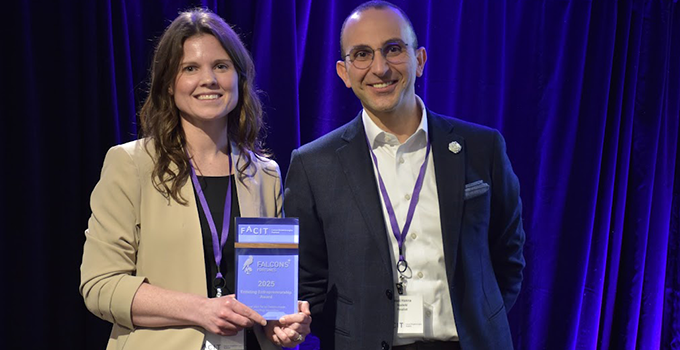Dr. Waël Hanna of NodeAI Diagnostics took home the $100,000 Ernsting Entrepreneurship Award for his innovative technology to improve lymph node biopsies.
Knowing whether lung cancer has spread to the lymph nodes is essential to treating it, but the procedure to biopsy lymph nodes is challenging — even for seasoned thoracic surgeons.
“It’s very finicky, and the technology has not changed in decades,” says Dr. Waël Hanna, Co-Founder of NodeAI, medical researcher and Division Head for Thoracic Surgery at McMaster University.
In the procedure, known as endobronchial ultrasound-guided transbronchial needle aspiration (EBUS-TBNA), the surgeon guides a small endoscope to the centre of a patient’s chest to find their lymph nodes. Then they must thread a tiny needle into the lymph nodes to get a biopsy, guided only by black-and-white ultrasound photos.
Even if the biopsy is successful, lymph node tissue is very difficult to process, and pathologists must have special training to interpret it.
“It’s a multi-step process and each step is challenging,” Hanna says. “It’s hard to optimize because each step relies on the expertise of someone different.”
As a result, Hanna says only half of lung cancer patients end up with reliable, accurate staging that helps to shape their treatment plan.
It’s why Hanna and his colleagues at McMaster started exploring ways to improve the EBUS-TBNA process. They developed an AI-guided solution called ‘NodeAI’ that can help thoracic surgeons assess whether lymph nodes are malignant in real time.
Now Chief Medical Officer of Hamilton-based startup NodeAI Diagnostics, Hanna pitched his technology at this year’s FACIT Falcons’ Fortunes event in March. The annual pitch competition, now in its 12th year, gives six cancer entrepreneurs the chance to showcase their innovations to a panel of expert judges and forms an important part of FACIT’s Ontario First intellectual property strategy and seed investment programs.
Hanna and NodeAI impressed the judges and took home the $100,000 Ernsting Entrepreneurship Award. FACIT’s pre-seed capital helps ventures like NodeAI advance along the innovation pathway and establish roots in Ontario.
We asked Hanna about his innovative technology, his experience at Falcons’ Fortunes, and how winning the award and support of FACIT will help bring NodeAI into the clinic.
Why did you set out to develop a technology to improve EBUS-TBNA?
Lymph nodes are very, very important in determining how we stage lung cancer. But most surgeons struggle to do accurate staging.My colleagues and I recognized we needed a standardized, reliable computer-based method to assist surgeons with the procedure and augment their judgement.
Tell us about how the NodeAI system works.
The surgeon goes in, finds a lymph node, and takes an image, just like with a normal EBUS-TBNA procedure. At that point, NodeAI reads the image and gives a readout within six seconds. Trained on data from thousands of lymph nodes, NodeAI is able to determine if a lymph node is normal or not with 85 per cent accuracy.
If the lymph node is found to be normal, the surgeon can confidently skip the biopsy. If NodeAI determines the lymph node is abnormal, the surgeon can proceed with a biopsy as normal.
What are the advantages for the surgeon and the patient?
The whole thing happens in real time, using the same equipment as a standard EBUS-TBNA. In total, it adds only about two minutes to the procedure.
Having this data in real time can spare patients from unnecessary biopsies, while improving their chances of accurate staging that can inform their treatment. It also allows the surgeon to focus on the lymph nodes that actually need to be biopsied and takes some of the burden of interpretation off of them during what is a very difficult procedure.
What’s the status of the technology?
We have done successful pilot studies and found no technical issues, and we’re about to start a multi-centre clinical trial at six cancer centres across Canada to gather data on how the system functions in different environments. Things are also moving forward with regulatory approval from Health Canada and the FDA in the United States, though a few steps still remain.
How was your experience pitching at Falcons’ Fortunes?
It was my first pitch competition, and I really enjoyed it. I’ve given a lot of academic talks, but I had to learn the particulars of pitching a startup in this context. I can’t say enough about the pitch training resources offered by FACIT to all finalists. It was extremely valuable for me and the NodeAI team and helped us frame the pitch in a way that highlighted the important elements of the technology and the company.
How will the $100,000 award from Falcons’ Fortunes help NodeAI?
This award will be very helpful as we navigate regulatory processes — particularly with the FDA, which can be very expensive. It will also help us hire a Clinical Trials Manager to manage the multi-centre trial we’re about to launch.
Most importantly though, we can leverage this award from Falcons’ Fortunes to help secure other funding, both through FACIT and other sources. Many seed funders will match the capital from other grants and awards. So winning Falcons’ Fortunes paves the way for NodeAI to acquire even more capital to help us advance our technology and get it helping patients as soon as possible.

